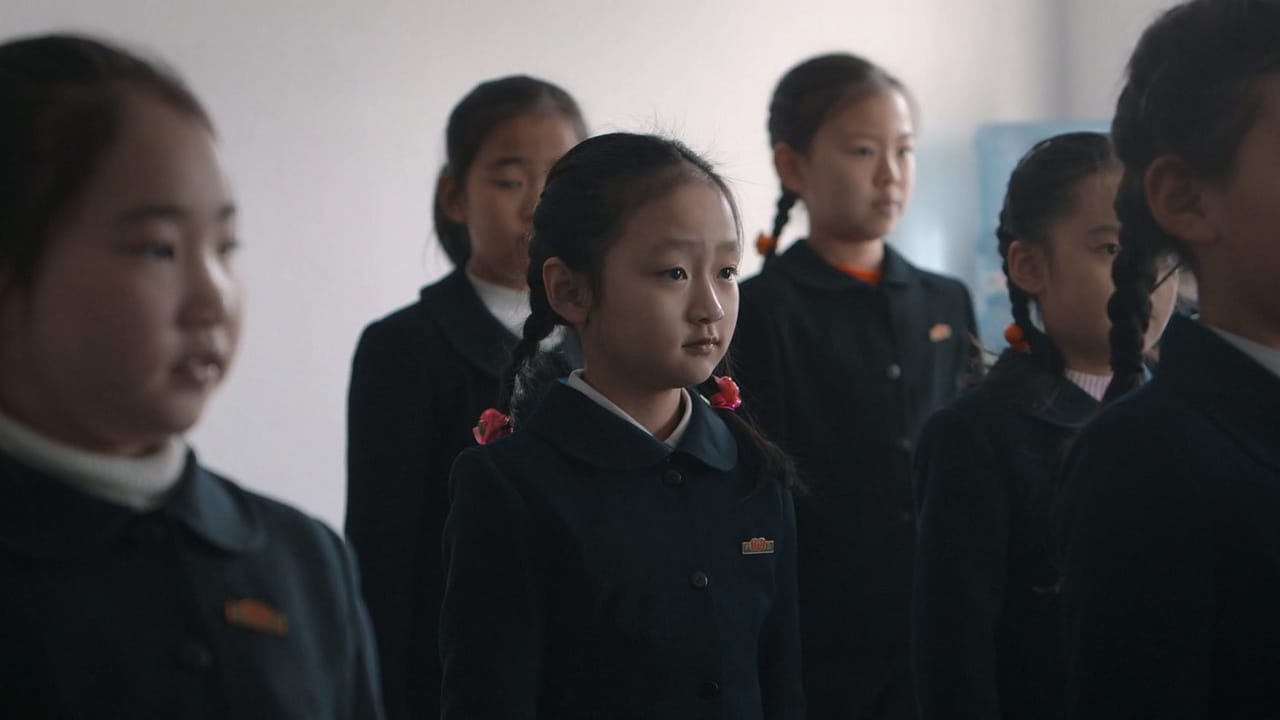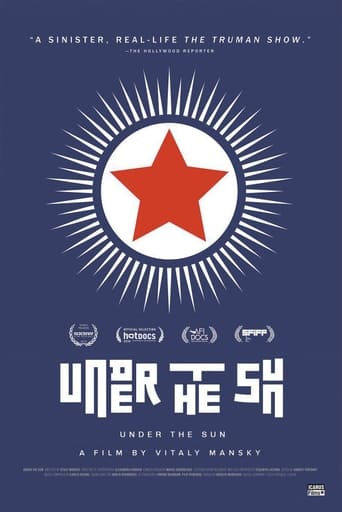



Let's be realistic.
Crappy film
At first rather annoying in its heavy emphasis on reenactments, this movie ultimately proves fascinating, simply because the complicated, highly dramatic tale it tells still almost defies belief.
View MoreUnshakable, witty and deeply felt, the film will be paying emotional dividends for a long, long time.
View MoreVitaly Mansky, a Russian documentary filmmaker, somehow negotiated his way into making a documentary inside North Korea. He soon discovered that he had no artistic freedom and had to follow a script that his North Korean handlers provided. The handlers gave him the opportunity to create a propaganda film focusing on an 8 year old girl, Zin-mi Lee, who lives in the capital city of Pyongyang with her parents and is about to join the Korean Children's Union on the Day of the Shining Star, the most important national holiday in North Korea, honoring their founder, Kim Il-sung.Mansky pulled a fast one on his North Korean hosts by continuing to film after the staged scenes had been shot. A crew member kept duplicate copies of memory cards with footage documenting how the North Koreans coached each scene and then smuggled them out of the country. Discovery of Mansky's ruse could have meant death or a very long imprisonment for him and his crew.The film first provides a glimpse of family life in the hermit kingdom. No effort is spared to present life in North Korea as a continuous idyllic pastime. The apartment is stocked to the brim with banquet-style food and little Zin-mi is coached in numerous takes on how to communicate the nutritional virtues of Kimchi, the Korean national dish. Apparently the eight year old wasn't spontaneous enough delivering the lines during the first few takes. Subtitles reveal that the family might not actually live in the apartment—that adults often live in barracks next to where they work and students in dormitories at their actual schools.We then move to Zin-mi's school where the teacher attempts to brainwash the students by way of repetitious drills. Children are made to recite the story of how the Japanese collaborated with evil landowners during the Japanese occupation over and over again. Only the great leader Kim Il-sung was there to thwart them. The implication of course is that the Japanese are as bad today as they were then.Later a retired general relates how evil Americans bombed innocent civilians during the Korean War, including children. Again the focus is on the distant past, with no history of subsequent developments in world affairs. Some unintentional humor is interjected when the handlers overseeing the production interrupt the General and instruct him to congratulate the children for their initial entrance into the Children's Union.Next up is the pageantry of the Children's Union ceremonies. There is a great deal of synchronized dancing and singing to martial-like music. The spectacle reminds one of Riefenstahl's "Triumph of the Will," commemorating the early rallies in Nazi Germany. The North Korean Children's Union is a worthy successor to the Hitler Youth.We then cut back to Zin-mi's father who purportedly works as a supervising engineer at a soy milk factory. Mansky relates that Zin-mi mentioned that her father was actually a journalist working for the government. The various outtakes show the North Korean producers exhorting the factory workers to be more cheerful. Again no effort is spared to present an image of complete employee satisfaction and productiveness in the workplace.The film concludes with the Day of the Shining Star celebrations—another spectacle this time featuring adults. Mansky captures the frightening aspects of the ceremony which is replete with goose-stepping soldiers, again reminiscent of Nazi Germany. After he keeps the camera rolling, the less impressive spectacle of groups of participants being directed how to leave the grounds via loudspeaker, is seen.Interspersed at certain points in the film are normal scenes of people walking on the street or in train stations. I was shocked at how quiet everyone seemed to be. Is this due to the depression of the general populace or is it based on fear of eavesdropping secret police?Mansky indicated in interviews that he made the film because he wanted to see how things could have been in Stalinist Russia. But after being in North Korea, he concluded that North Korea was far worse as far as political repression is concerned. At least in Stalinist times, culture was still alive and people still exchanged ideas. Mansky views the North Koreans as "zombies," who have no interest in learning anything outside their narrow-minded culture that features a cult of personality.After watching this documentary, I concluded that the North Koreans act the way they do as they have a deep fear of humiliation. The possibility of a "loss of face" drives them to present an image to the world that everything there is good. There is the theme that they don't need outside help and it would be too humiliating for them to admit of the deep problems endemic to their society. One must also note the deep-seated sadistic, vengeful impulses that are inculcated into peoples' minds there through propaganda and a manipulative educational system.Under the Sun feels a little too long and Mansky might have improved his documentary a bit by chopping some of the scenes involving garish spectacle. After a while, some of that propaganda stuff gets a bit overbearing. Still, Mansky has risked life and limb to bring us a truly chilling state of affairs which is North Korea today.
View MoreIn my opinion author is overstating 1984 part of life in the North Korea. Yes, it is his point of view, but sometimes i was annoyed by it, especially at moments when by adding music author trying o enlarge sadness of what happening. The funniest thing in all of this if such movie must be shooted in Russia by Russian elder people control the plot can be similar! It also will be all the best: hospital, accommodation, food, theater. Showing us helpless veteran with someone, who told him what to say. Or children repeating scene after scene the same words. Or main character and her parents in scene with eating. But it is movie, there are always director in the movie. Also there are actors in movies, so it is nothing wrong with mismatch in jobplaces and other information. North Korea was showed in traditional way - all bad, people sad, nothing will ever come out from this. But in this movie it was performed with inappropriate resources : if you change music, add some lights to scenes - it will be another movie with other ideas.
View MoreA foreign crew is somehow given permission to shoot in North Korea. The term "documentary" is a bit far-fetch here, since everything is actually staged by an escort crew that supervises, scripts, directs and rehearses every scene being filmed.If you want to see what George Orwell's NINETEEN EIGHTY-FOUR would look like if it became real life, watch this documentary.Watching it, I got strong vibes of movies such as EQUILIBRIUM, METROPOLIS, SLEEPER and THE PRISONER. Basically, every movie which depicts life in a state of dictatorship becomes a reality here and Orwell's book is the bible. All the elements from his book can be found here: Pictures of the leader at every corner, a constant state of war with military at every corner and as the center of every class in school, brainwashing the minds of people since an early age and basically turning them into human robots that would obey everything they are being told to do and learning how to hate the Japanese and Americans, production is always told to be getting "more efficient", TV constantly broadcasts programs about the leader, his military and war, and you hardly see anyone smiling.This is life in a constant state of fear and it's a living nightmare.The movie is far from perfect – many scenes are way too long and repetitive, tighter editing could have made wonders here – but its value lies in the achievement of showing a surreal regime that is almost impossible to believe that still exists in the 21st century and showing how "reality" can easily be fabricated.Good cinematography and excellent musical cues by Karlis Auzans.6.5/10 Highly recommended
View MoreI felt really dirty watching this film. The spectator position the camera angle forced me to take is seriously creepy. The way it constantly zooms in on the faces of those little girls is really unsettling. I get it. It is trying to show how bored and disengaged they look when, for example, they are sitting in the audience of an army general telling his scripted war stories. And how contrived and artificial the whole setup is.But what exactly am I supposed to feel about their situation through this kind of camera works? Pity? Contempt? Anger? Enlightenment? Amusement? Relief over how much better my life has been compared to their "Orwellian" one? I think I'm not the intended audience for this film because I just felt really manipulated.The premise of this film is fairly simple. When you display both what's meant to go on screen and what's meant to be cut out, you demystify the magic of cinema, and reveals the inherently grotesque silliness of the stage directions inhabiting beneath the making of what was meant to be a moving grand narrative.But what does that show us about North Korea? That they are oppressive and "Orwellian"? How? Because their cinematic productions are STAGED? Because their actors have SCRIPTED lines? Because they arbitrarily decide and change what scripted career the girl's father really have? Because they picked for a main character someone who happen to be well-off and went to the "best school"? No. You can do the same thing to the whole genre of "Realty TV" that we consume and get the same contrived, staged, scripted, silly result.If that's all it takes to show how a regime is oppressive, then we need to take a good close look at the same contrived undercurrents feeding into the media we consume and take for granted. There is nothing novel or unique to North Korea about the stage-directions that went into making this film. The only thing that's really different about this film is that it had lazier editing than the "Realty TV" we are used to.Ultimately, this is a feel-good film built on orientalism.We are not compelled to think about the very same contrivances that goes into the backstage of our own media productions. But a full-frontal coverage of the North Korean cinematic backstage is somehow fair game. We are not meant to question this. I have learned nothing about the lived realities attendant to the citizens of this country by the end of this film, but I was unwittingly fed copious amount of resources to help me exoticize and fetishize this country and its people.And that seem to be what this film offers. It's not informative of its very subject-matter by any stretch of the imagination. But it does let us have a good laugh about it, all the while we pretend this is somehow radically different from our own media realities.
View More